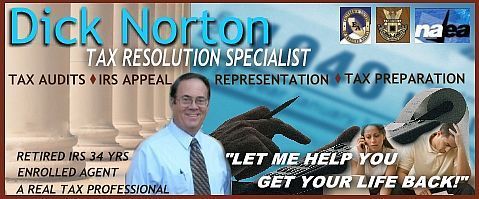I just received a notice that my return has
been selected for examination. What now?
First thing, do not panic. Most examinations are routine and result
because your tax return did not quite match the "norm" for a taxpayer in your line
of work and reporting approximately the same amount of income. It does not
mean that there is anything wrong, but from the IRS perspective, the probability
of you having made a mistake is worthy of checking out.
The general rule is that you never - repeat, never - want to ignore this notice!
In most all situations,
the best advice is to
cooperate with the IRS as much as possible. If you make the auditor or
agent's task difficult because of your lack of cooperation, the employee will be
far less agreeable to giving you the benefit of a doubt when deciding on what
evidence or oral testimony to accept that you offer in support of questioned items.
While you will have the ability to appeal any proposed deficiency
resulting from the audit, that is a costly process that you should avoid
if at all possible.
If you are aware of a significant error or omission on your return (such
as income you did not report), seek
professional advice immediately! How you respond can dramatically affect
the outcome of your audit. In very limited circumstances, you may even
need to retain a tax attorney immediately if your error or omission could
possibly be viewed as fraudulent with possible criminal prosecution.
There are four types of
audits - correspondence; office audit; Small Case/Self-employed (SBSE); and
Large and Mid-sized business (LMSB).
* Correspondence audits
begin with a letter sent to you from an IRS Campus (Service Center) location and will identify
a few (generally) specific deductions or credits the IRS wants
you to verify. You mail or fax copies of your documents (checks,
invoices, etc) to substantiate the deductions or credits the IRS is
questioning. At the conclusion of their review, the examiner will
send a letter either notifying you that the IRS accepts your return as
filled, or proposes to change your return by adding income, reducing
deductions or reducing credits. If you believe the tax examiner's
proposal is wrong, you can appeal the proposed deficiency, but the time
to file that appeal is limited.
* Office Audits
begin with a letter that contains a pre-scheduled appointment for you to
go to a local IRS office for a face-to-face meeting with a Tax Compliance Officer
(TCO). The letter will include an Information Document Request that lists
specific items you need to bring with you for review by the TCO.
Examples could be your bank statements (the TCO will total the
deposits and compare that with the income reported on your return),
a log of your automobile mileage (if you are in business),
specific invoices or receipts, and other documents. Usually if you
bring everything requested to the first meeting, that is the ONLY
meeting you will have with the TCO. Occasionally during the audit, the TCO may
discover another area in the return that merits further review. In
that case, you may be asked to come in again with more data, or to
simply mail in copies of additional records. You NEVER mail in
originals!!!
At the conclusion of the audit, the TCO will
give you a report listing the proposed changes to your return if
there are items on your return he or she feels were erroneous. If you agree
with the proposed changes, you sign the report. Otherwise, you
have a short period of time to review the report in more depth and then
you can either sign it or file an appeal.
*
SBSE Audits begin with a
letter signed by an Internal Revenue Agent. These are often called
"field audits" and are the most in-depth audits and typically take place
at either the taxpayers business or residence, or if the taxpayer is
represented by an Enrolled Agent, CPA or Attorney, at the
representative's office. These are face-to-face examinations. The
Revenue Agents who conduct these audits will provide an Inormation
Document Request that informs you of the items to have available for the
initial meeting. Often, these audits will require more than
one meeting. If you operate a business but the audit is being
conducted elsewhere (such as the representative's office), the Agent
will often want to visit the place of business just to get an idea of
the scope and nature of the business operation. At the conclusion
of the audit, the Agent will provide a copy of his or her report.
If changes are proposed to your return, you have the option of agreeing
to those changes, or to appeal the proposed changes (all of them or just
some). Appeals for these audits are more sophisticated and are
usually prepared and submitted by professionals.
* LMSB Audits are
face-to-face examinations that usually involve a team of general Revenue Agents
and specialist Revenue Agents who are experts in employment tax and computer
sciences, for instance.
Regardless of the type of audit, taxpayers should seriously consider
seeking professional help. Saying the wrong thing to an IRS
employee, or mailing in material without knowing what issues it
could bring, may lead to either an erroneous proposed adjustment, or
an expanded audit. Either of those scenarios could well exceed
the cost for representation. With decades of inside and
post-retirement experience with IRS audits, I am certainly worthy of
consideration to represent you in this process.
A brief conversation about the audit you are facing is without cost
to you, so you have nothing to lose by e-mailing or calling me.


